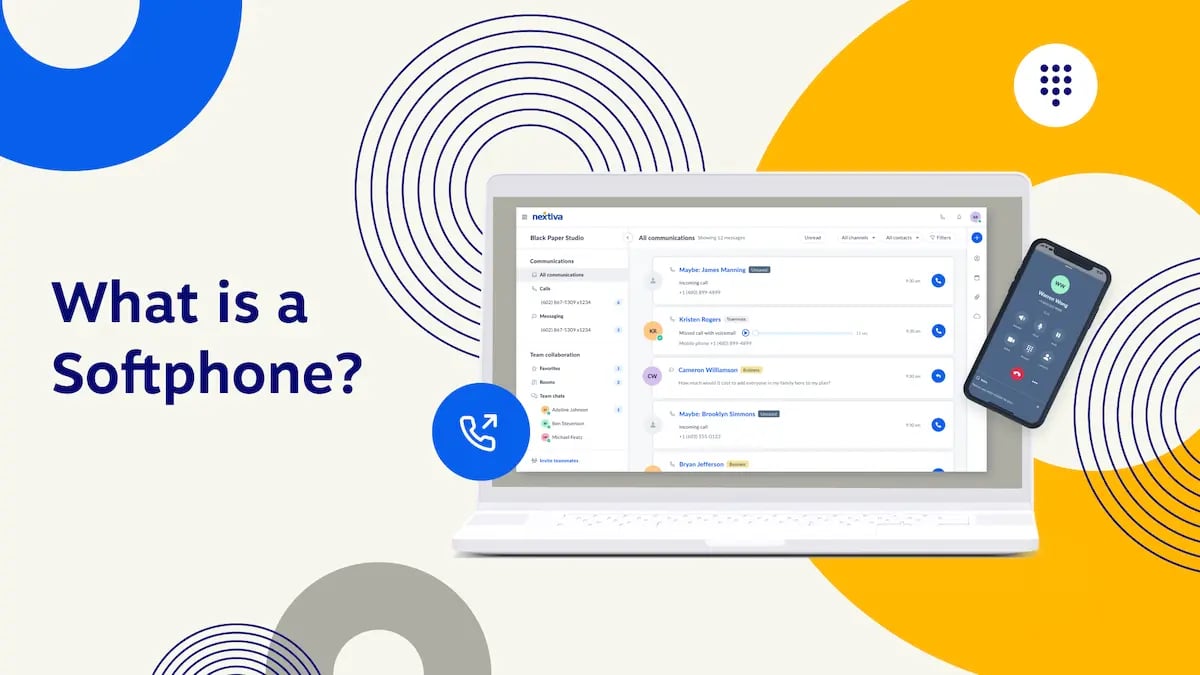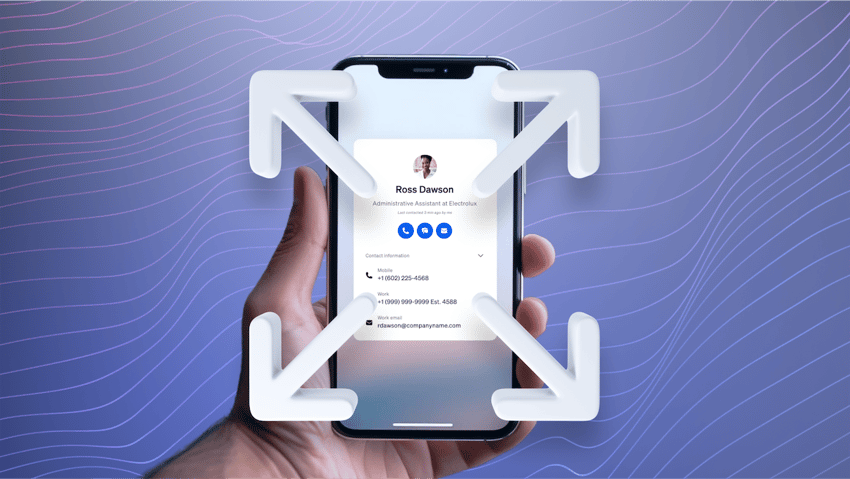Need to make calls using your business line? Want the flexibility of working from anywhere?
Then you want a softphone. What was once a luxury is now the standard for business communications.
What Is a Softphone?
A softphone is a software application that enables users to make and receive phone calls over the internet using a computer, tablet, or smartphone. Instead of relying on traditional hardware, such as desk phones, a softphone provides a digital calling interface that operates through Voice over Internet Protocol (VoIP) networks. Businesses use softphones to manage communications more flexibly, supporting remote teams, hybrid workforces, and centralized call operations.
Softphones replicate the functionality of physical phones while offering expanded features. Many applications include call forwarding, voicemail, call recording, instant messaging, video conferencing, and integration with CRM platforms and other collaboration tools. Employees can place calls from their professional business numbers, maintaining privacy without the need to share personal mobile details.


How softphones work
Softphones receive connectivity from a VoIP provider based on a user’s credentials. Calls are placed directly through the app, using the device’s built-in audio capabilities or a connected headset. The voice data travels over IP networks, providing voice calling using only an internet connection.
Softphones let employees to call anyone from their business phone number rather than their mobile phone for added privacy.
At a technical level, softphones rely on trusted communication protocols such as SIP (Session Initiation Protocol) to initiate, manage, and terminate calls. Digital voice packets are transmitted across the Internet, enabling efficient and high-quality voice communication as long as the device maintains a stable broadband connection.
Got a few minutes? Jessica breaks it all down for you in the video below.

A VoIP phone service provider, such as Nextiva, typically offers softphone apps for download. Alternatively, there are standalone softphone apps that require further configuration.
In just a few minutes, you’ll get a closer look at softphones and see why they’re so popular, their key features, and our top picks for the best softphone apps for you and your team.
How softphones work
Softphone systems use Voice over Internet Protocol (VoIP) technology to manage telephone calls. A softphone lets you make phone calls over the Internet using a computer, tablet, or mobile device.
Once signed into a VoIP phone service, softphones register themselves to answer or place calls. From there, the provider maintains the connection and other phone system functions.
Unlike traditional phones, a softphone isn’t a physical device. Instead, it’s software that provides a familiar phone interface on your device. It allows small businesses to make and receive calls using a virtual phone number, send messages, and conduct video conferences from anywhere. Softphones support out-of-office communications without losing features during transitions.
Start calling for just $15/mo.
See why over 100,000 businesses switched to Nextiva. Now you can get it all for $15/month per user.
Why Businesses Choose Softphones
When you want to get your team talking, softphones are a great choice.
- Cost-effective desk phone alternative
- Instant setup and deployment
- Access to more features
- Easy to use and support
1) Cost-effective desk phone alternative
A VoIP softphone is a cost-effective alternative to the expensive traditional phone lines and hardware systems. Businesses that switch to softphones typically reduce phone costs by 60% by eliminating the need for expensive desk phone hardware.
Unlike a VoIP phone, you typically get softphone functionality included (or at a low cost) with your existing business phone service. This way, you’re not left paying for equipment you don’t fully use.
2) Instant setup and deployment
Downloading a softphone application on your computer or mobile device takes only minutes. Setup usually only requires logging in with your VoIP provider’s credentials. Onboarding new team members is also quick, as it only involves creating an account.
Softphones are compatible with various devices and operating systems. The best choice is to download a software application, but your web browser can also work well.
Since there’s no physical hardware involved, you can have your softphone ready to use within minutes.
3) Easy to use and support
Today’s softphone apps offer an intuitive interface, such as a telephone dial pad, tabbed sections, and real-time notifications. There is usually some consistency between desktop and mobile apps, making them familiar to users.
And since they’re software-based, updates can be rolled out to introduce new features without the need for physical system modifications. Ensure your softphone provider has robust security measures in place to safeguard your communications.
4) Access to more features
Softphones often come with a wider range of features than conventional phones.
These features can help improve call handling, enhance collaboration, and simplify communications. Examples include call forwarding, CRM integration, video conferencing, and call transfers. Calls made with softphones can also be easily integrated into customer relationship management (CRM) systems. Softphones enable conference calling and video calling at no additional cost.
Starting a call center soon? The same softphone app offers this functionality built-in for your team.
Softphone benefits for enterprises
- Enhance call center efficiency. Call centers utilize softphones to boost agent performance. Features such as intelligent call routing, call queuing, live monitoring, and performance analytics enhance service delivery while reducing hardware and maintenance requirements.
- Simplify technology requirements. Softphones eliminate the need for desk phone hardware, simplifying deployment and reducing costs. Their ability to integrate with key enterprise platforms like CRM systems and help desk tools streamlines workflows and supports more coordinated communication strategies.
- Adds greater business agility. Adding softphones for your team requires no additional physical infrastructure. New users can be added quickly with minimal setup, making it easy for businesses to scale communication operations in line with staffing needs.
What are some additional features that softphones offer? We’ve got you.
Essential Softphone Features
Despite its name, softphone software does much more than just place and receive phone calls; it also includes advanced calling features.
- HD voice calls: Talk to users in richer, high-definition quality. It makes your voice sound clear, crisp, and confident to callers.
- Contact lists: Store, access, and manage contacts to improve efficiency and organization. Never frantically search for the best number to reach someone.
- Text messaging: Send and receive SMS and MMS messages through your softphone app. This lets you send text messages from your VoIP line.
- Video calls: Meet face-to-face in a video conference from your softphone app. There are no separate apps or clunky downloads.
- Visual voicemail: Easily playback or even read voicemail messages, with no confusing pins or keypresses to memorize. You can also receive these voicemail transcriptions via email.
- Computer Telephony Integration (CTI): CTI functionality enables you to answer, reject, or hold calls using your headsets. Effortlessly manage calls like a pro through a softphone.
- Presence management: Indicate if you’re unavailable for calls, on a call, or are available to receive incoming calls.
- Call transfer: Seamlessly transfer calls to another user or team within your business. This way, callers don’t have to call back again.
- Encryption: Ensure your conversations are secure and stay private. Softphones encrypt telephony data, regardless of the type of internet connection you have.
- Conference calling: Conduct a group audio call instantly without a complicated dial-in process. Your team is collaborating with just a click.
- Call recording: Record phone calls automatically or on demand, allowing you to review past conversations and enhance quality assurance.
- Caller ID: Manage the provided caller ID information, including your name, company, area code, and phone number.
- Call forwarding: Toggle to enable or disable forwarding your calls, such as to another team member or your company’s auto attendant.
- Call pulling: Swap devices without any interruption. For instance, if you’re going from a desk phone to a softphone or vice versa.
Top Softphone Apps for Business Use
So, which softphone should you use? You have many options, but here’s a quick roundup of different VoIP apps.
1. Nextiva
NextivaONE by Nextiva is more than a softphone system — it’s an complete communications solution. The company includes a free softphone on any desktop (Windows, Mac, or Linux) or mobile device (iOS, Android).
With Nextiva, you can manage calls, send texts, and conduct video conferences from your computer or mobile device. This makes it a cost-effective solution for businesses, as it eliminates the need for expensive hardware by allowing employees to use their personal devices.
Softphone apps from Nextiva offer businesses a lower-cost option for deploying office communications, providing essential features for remote work and call centers. This makes them an attractive option for companies seeking to optimize their communication infrastructure.
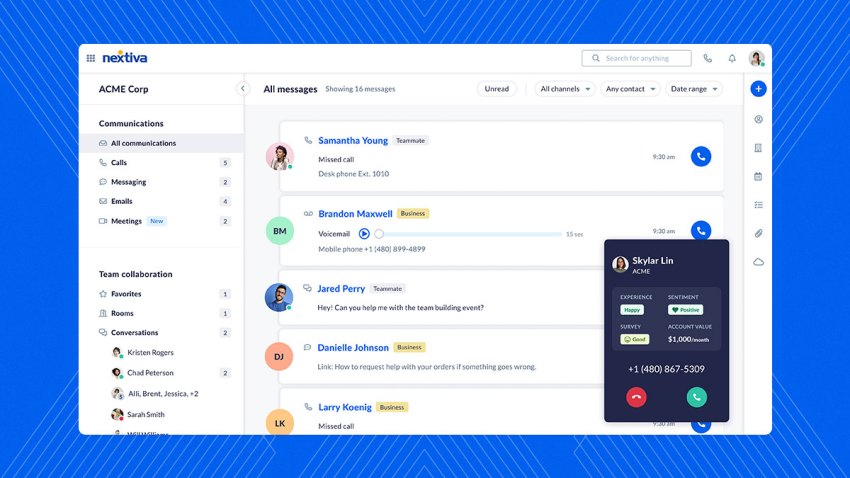
Start calling for just $15/mo.
See why over 100,000 businesses switched to Nextiva. Now you can get it all for $15/month per user.
2. Zoiper
Zoiper is a standalone softphone app. It supports many types of codecs for VoIP calls, making it a versatile choice for businesses of all sizes and compatible with various VoIP providers. It requires IT pros to set up and deploy across your company.

3. Bria Solo
Bria Solo (formerly known as X-Lite) by CounterPath is another great softphone solution. Bria Solo is built for those who need a platform to manage voice calls, video conferences, messaging, and team collaboration. X-Lite is no longer available for free, but is available for a free two-week trial.
But more practically, it’s a handy dialer for testing out a SIP trunk or lighter-duty voice communications using Session Initiation Protocol.
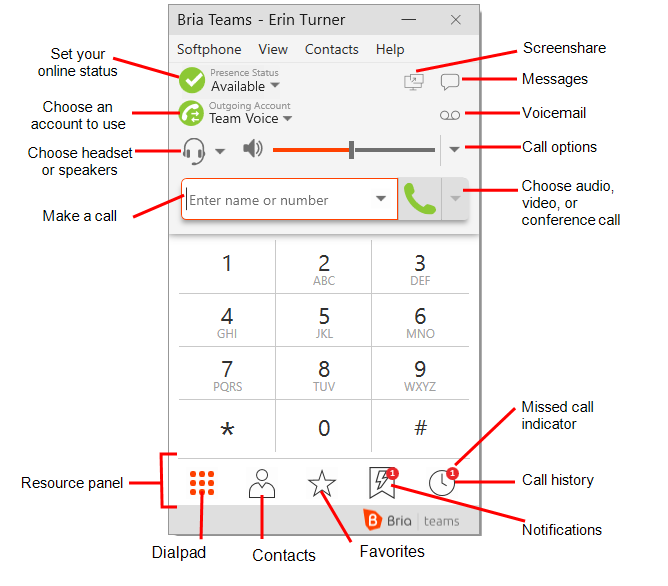
4. 3CX
3CX is a self-hosted PBX that also includes its softphone apps. It’s highly customizable but also requires a lot of configuration in the real world for businesses.
Its softphone app is available for desktops, smartphones, and other devices. You’ll want to have a tech professional help you navigate this, as choosing the right softphone provider is crucial for optimal performance.
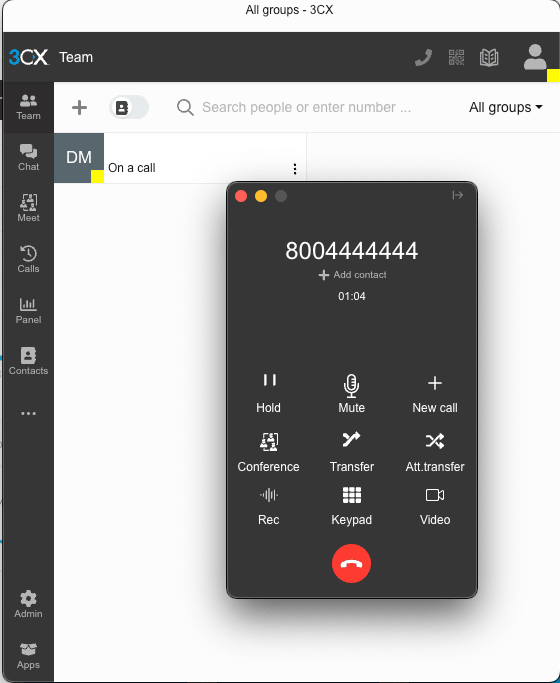
Softphones vs. Hardphones (Desk Phones)
How does a softphone technology fare against a VoIP desk phone? Here’s how they compare.
| Feature | Softphone Apps | Hardphones |
|---|---|---|
| Hardware | No extra hardware is needed. It downloads to desktops, laptops, tablets, and smartphones. | Requires a physical IP phone handset and dedicated hardware. |
| Installation | Download an app, sign in, and begin using it right away. | Needs Ethernet, power wiring, and, typically, additional configuration. |
| Portability | Can be used wherever there is an Internet connection, including LTE and 5G cellular data. | Limited to wiring and physical office spaces. |
| Flexibility | Tailored to user preferences and business needs, such as call routing or call center functionality. | Limited to VoIP hardware functionality and headset connectivity. |
| Cost | Free with an existing VoIP service. | Can be used anywhere with an Internet connection, including LTE and 5G cellular data. |
What are the advantages of a hard-wired VoIP desk phone?
Hard-wired phones offer a familiar tactile interface to quickly call people, along with dedicated network connectivity (Ethernet). Want to page your team, see if your exec is on a call, or dial an extension quickly? Hardphones handle all of that flawlessly. Call data for traditional phones is transmitted via copper landlines from a fixed location.
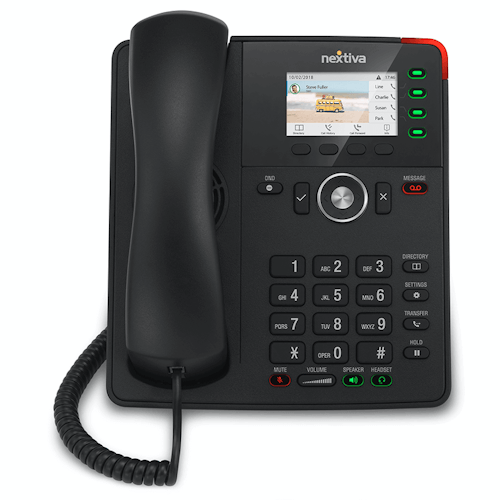
Desk phones are designed to be used without additional steps, such as unlocking your mobile phone or finding the icon on your computer. They also aren’t subject to your smartphone’s battery life (we’re looking at you, 20%-ers!)
Browse our pre-configured VoIP phones to see how the features and functionality differ. Not sure which devices to choose? Talk to an expert who can build a tailored package for you.
Bottom line: Softphones work hand-in-hand with VoIP desk phones. They give your teams the choice to work and collaborate on one platform.
The Best Communication Platform for Teams
Whether you opt for a softphone or a desk phone, you need the right communications platform. Determine the number of phone lines your business will need and ensure the provider can support the required number of lines.
Start calling for just $15/mo.
See why over 100,000 businesses switched to Nextiva. Now you can get it all for $15/month per user.
Nextiva offers a unified communications solution to enhance your team’s collaboration and maintain seamless communication with customers. Setting it up is a breeze, and if you ever need guidance, you’ll have access to award-winning customer support. Look for a provider that offers 24/7 troubleshooting and customer support with raving customer reviews.
⚙️ Integrate with your existing business tools, making it easier for you to manage your business communications.
💪 Experience ultra-high reliability and uptime, ensuring your team stays connected and serving customers.
💸 Save up to 60% on communications costs with flexible pricing and more functionality.

Softphone FAQs
A softphone and VoIP communications are closely related, but they are not the same thing. VoIP, or Voice over Internet Protocol, is a technology that enables voice communication over the Internet. A softphone, on the other hand, is a tool that utilizes Voice over Internet Protocol (VoIP) to make and receive calls.
Think of VoIP as the underlying engine and the softphone as the app you use to drive it. In 2024, Gartner reported that VoIP adoption grew by 15% year-over-year among businesses upgrading their communication systems.
Yes, many modern softphone applications allow users to send and receive SMS and MMS messages. This feature enables businesses to maintain professional communication from their business numbers rather than personal mobile lines. Features like texting, video conferencing, and team messaging are typically built into today’s softphone platforms.
According to a 2024 study by Nextiva, 45% of businesses using softphones reported an increase in customer satisfaction thanks to integrated texting features.
Standalone softphone apps typically cost around $50 for an annual license, although prices may vary depending on the provider and the specific features required. Top-rated business phone providers, such as Nextiva, offer free softphone apps as part of their VoIP service, starting at $15 per month per user.
Compared to traditional desk phones, which often cost $130 or more each, softphones offer a significantly lower total cost of ownership. Businesses adopting softphones can reduce communication costs by up to 60%.
VoIP offers several advantages over traditional cell phones for business communication. With VoIP, companies can achieve lower costs, improved scalability, and advanced features such as call routing, conferencing, and CRM integration. VoIP systems, primarily when accessed through a softphone, also allow employees to keep their business and personal lines separate.
Companies switching to VoIP saved an average of 50% on communication expenses while improving call reliability and quality, especially when choosing the right VoIP provider.


















 VoIP
VoIP 
